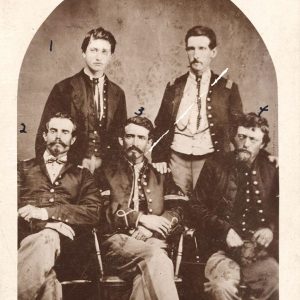calsfoundation@cals.org
Yellville Expedition (November 25–29, 1862)
The five-day expedition to Yellville (Marion County) in late November 1862 was a successful Union raid to disrupt Confederate saltpeter mining operations and destroy a rebel arsenal.
Arkansas’s Confederates mined saltpeter, an important ingredient in creating gunpowder, from limestone caves in the Ozark Mountains, and Union forces periodically attacked the mining facilities, resulting in such actions as the April 19, 1862, Skirmish at Talbot’s Ferry. After learning of saltpeter operations in Marion County in late November 1862, Brigadier General Francis J. Herron sent an expedition from southwestern Missouri to attack them.
Colonel Dudley Wickersham of the Tenth Illinois Cavalry Regiment led his regiment, along with the First Iowa Cavalry and a battalion of the Second Wisconsin Cavalry, into Arkansas on November 25, 1862, beginning a five-day, 250-mile expedition.
Wickersham’s troops destroyed a saltpeter works at Dubuque (Boone County) in addition to a major success at Yellville, in which another saltpeter operation was wrecked, 500 rifles and shotguns were seized from a Confederate arsenal that was then destroyed, and the 150 rebels in the hospital were paroled. The Union cavalrymen captured sixty men from Colonel John Q. Burbridge’s Fourth Missouri Cavalry (CS) and brought “over 100 good horses” back with them when they returned to Herron’s base on November 29. “Our troops have left the place in such shape that I do not think the rebels will again attempt to make a depot,” Herron reported, and Major General Samuel Curtis congratulated “your cavalry on the success of the expedition to Yellville, Ark. Colonel Wickersham is especially deserving of my thanks.”
While the expedition to Yellville took out some of the Arkansas Confederacy’s saltpeter mining operations, others continued, becoming the targets of additional Union raids such as the one that involved the January 10, 1863, Skirmish at Kingston in Madison County.
Confederates and guerrillas would continue mining saltpeter in the Ozarks until the end of the Civil War.
For additional information:
Lothrop, Charles H. A History of the First Regiment Iowa Cavalry Veteran Volunteers, From Its Organization in 1861 to Its Muster Out of the United States Service in 1866. Lyons, IA: Beers & Eaton, 1890.
The War of the Rebellion: A compilation of the Official Records of the Union and Confederate Armies, Series I, Vol. 22, part 1, pp. 38–39. Washington DC: Government Printing Office, 1888.
Mark K. Christ
Central Arkansas Library System
 Civil War Timeline
Civil War Timeline Military
Military First Iowa Cavalry
First Iowa Cavalry 



Comments
No comments on this entry yet.